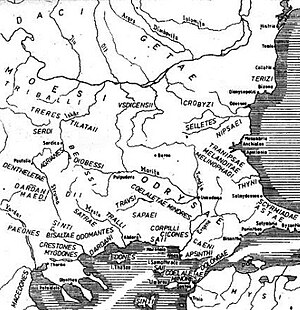Serdi

The Serdi were a Celtic tribe[1] inhabiting Thrace. They were located around Serdica (Bulgarian: Сердика, romanized: Serdika; Latin: Ulpia Serdica; Greek: Σαρδική o Σαρδῶν πόλις, romanized: Sardike o Sardon polis), now Sofia in Bulgaria,[2] which reflects their ethnonym. They would have established themselves in this area during the Celtic migrations at the end of the 4th century BC, though there is no evidence for their existence before the 1st century BC. Serdi are among traditional tribal names reported into the Roman era.[3] They were gradually Thracianized over the centuries but retained their Celtic character in material culture up to a late date.[when?][citation needed] According to other sources they may have been simply of Thracian origin;[4] according to others they may have been of mixed Thraco-Celtic origin.

See also
[edit]References
[edit]- ^ The Cambridge Ancient History, Volume 3, Part 2: The Assyrian and Babylonian Empires and Other States of the Near East, from the Eighth to the Sixth Centuries BC by John Boardman, I. E. S. Edwards, E. Sollberger, and N. G. L. Hammond, ISBN 0-521-22717-8, 1992, page 600: "In the place of the vanished Treres and Tilataei we find the Serdi for whom there is no evidence before the first century BC. It has for long being supposed on convincing linguistic and archeological grounds that this tribe was of Celtic origin"
- ^ SE´RDICA
- ^ M. B. Shchukin, Rome and the Barbarians in Central and Eastern Europe: 1st Century B.C.-1st Century A.D.
- ^ Britannica
